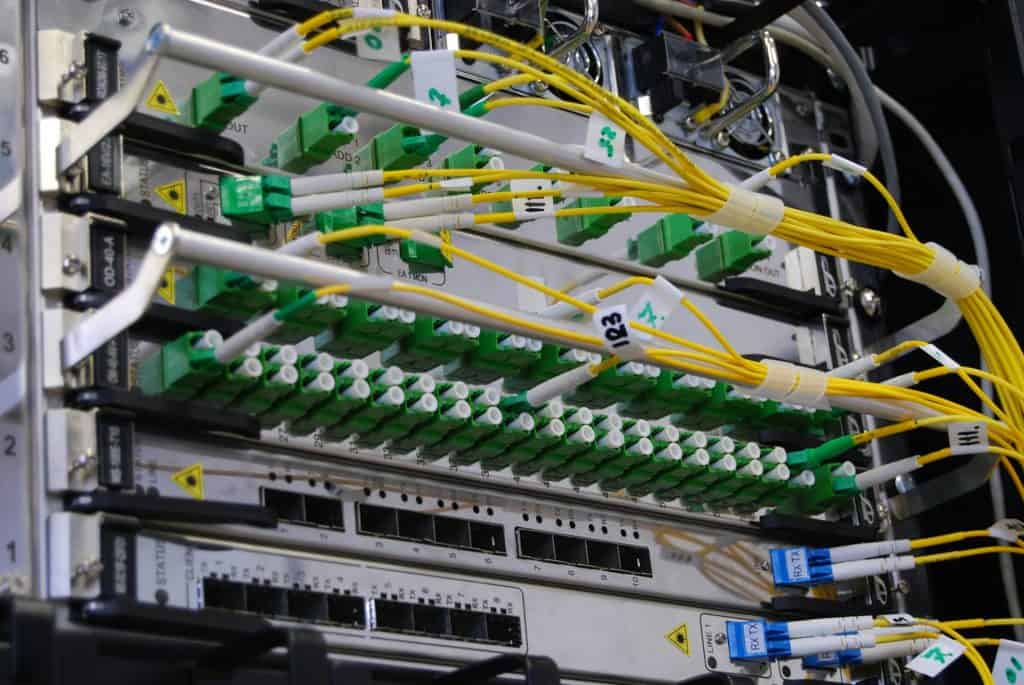Last Updated on February 2, 2025

Firstly, it’s important to understand what the PSTN actually is.
The Public Switched Telephone Network is the physical infrastructure that carries voice calls over the traditional system through exchanges and switches.
PSTN facilitates voice communication through a global network of copper lines, fibre optics, and switching centres.
Originating from analogue technologies, PSTN has evolved over decades with digital enhancements, but its core purpose remains connecting landlines and supporting essential services like fax, CCTV and emergency calls.
As the PSTN relies on circuit-switched technology, it dedicates a specific channel for the duration of a call.
However, with the rise of Internet Protocol (IP) and more scalable solutions like VoIP (Voice over Internet Protocol), the PSTN is nearing the end of its lifecycle.
What many don’t know is that the government is planning to retire this system entirely by 2027, giving UK businesses just 2 years to prepare, and if you don’t have a VoIP solution in place beforehand, your landline will no longer be able to run via the copper wire network, putting your service at risk of being switched-off or turned off entirely.
What is the PSTN switch-off?
The PSTN ‘switch off’ is the term used by the government to retire its old network of dedicated copper and fibre wiring that carries just voice calls around using exchanges and switching centres.
Originally scheduled for 2025, there were delays due to dedicated emergency service lines and emergency systems installed in sheltered accommodations.
This is now scheduled for 2027, and businesses are being advised to prepare for the transition by switching to VoIP or a virtual number.
Openreach, which manages much of the UK’s telecom infrastructure, is actively working on this process.
What is a PSTN?

PSTN stands for Public Switched Telephone Network and is the traditional wired system that the country and international areas use to connect voice telephone calls all around the UK and abroad.
PSTN uses dedicated line space to connect calls and is less efficient than IP calls. It can be sent more quickly and without using so many resources.
Using a physical infrastructure of physical copper and fibre optic lines, it hits exchanges and switching centres all around the country until it hits its intended destination, whereas IP calls are much quicker and less resource-intensive.
Are PSTN lines being phased out?
Yes, the current date for switching this network off is 2027. However, this was delayed from 2025 due to a commitment by Openreach and the government to protect vulnerable users, emergency services, and the public sector.
Why is the switch-off happening?
Running and maintaining the old PSTN system, where calls were operated on a dedicated phone line for each interaction, is much less effective and efficient than running VoIP or IP calls.
VoIP calls are transmitted over the internet in packets, meaning they can be transmitted simultaneously as other data, making them much more efficient and cheaper.
Additionally, VoIP offers better call quality, reliability, and advanced security features.
Date of the PSTN Switch off (2025 or 2027?)
Initially, the switch-off was scheduled for 2025. However, this was delayed to 2027 as the government and telephone providers had committed to ensuring the protection of vulnerable customers and emergency services which rely on the old network.
There is also a need to make sure IoT devices can connect.
Things like personal alarms and devices to alert emergency services to potential falls and illnesses for disabled and elderly customers couldn’t be migrated in time.
Still, it’s thought this can be resolved before the new date of 2027.
Has the switch-off been delayed?
Yes, the switch-off has been delayed by 2 years to 2027 due to complications with migrating vulnerable customers and emergency services.
What does this mean for UK Businesses?
Most of the UK’s biggest and medium-sized businesses switched to VoIP systems in the past 5 to 10 years due to cost savings and efficiency improvements, especially those with many employees, as VoIP allows much easier scaling than traditional phone lines.
For smaller UK businesses, many, if not a majority, are still on the old PSTN network, meaning that if they don’t find an alternative before the switch-off date, they face losing their phone number or their systems simply not working.
Without preparation, they risk losing their phone numbers or facing disruptions.
This is especially crucial for sectors like IoT and management systems reliant on telephony for their operations.
What are the alternatives?
VoIP is the obvious alternative for business, as the larger and more established businesses have found over the past 5 to 10 years.
The benefits of VoIP are that it’s better quality, more cost-effective, and it is often more reliable.
VoIP services
For those looking at alternatives, VoIP is an extremely accessible, affordable, and effective alternative, and the vast majority of our customers find it superior to traditional older alternatives.
With Air Landline, we offer a free 7-day trial where you can select your area code, and we’ll then generate your virtual business number, or you can transfer your existing number over to us completely FREE.
You’ll see that VoIP has several benefits over older, more traditional phone services, and we’ll cover some of them below.
Benefits of VoIP
VoIP as a service has many benefits when compared to older PSTN lines.
Let’s look at what our customers tell us are the most important reasons they switched to a VoIP number.
Instant automated set-up
With VoIP, setting up your business number is quick and seamless. As soon as you create an account, your number is generated and ready for use within minutes.
There’s no need for lengthy installation processes or waiting for engineers – your system can be up and running instantly.
No need for an app
With Air Landline services, there’s no need to download an app to your mobile device inorder to receive incoming calls.
Simply go through our simple 3-step process to sign up for your 7-day free trial, and we’ll ask you to pick an area code, and we’ll generate a dedicated virtual telephone number.
From there, you need to tell us where to divert it, and you’re good to go.
High call quality
Because VoIP calls are transmitted over the Internet, the call quality is extremely high, and the connections are clear and quick.
As opposed to PSTN or traditional business calls, texts and traditional calls can suffer from line interference and degraded services.
Free diversion
We don’t charge you extra to forward your VoIP business calls to your mobile; we include unlimited incoming calls to your mobile.
Some providers can charge business owners up to 20p per minute for these calls, but they’re included in our monthly subscription fees with no limits.
Cancel at any time
We don’t tie you into lengthy contracts you can’t get out of.
We do provide a 30-day rolling contract, which can be cancelled at any time.
Although we don’t have contracts, your monthly subscription still includes advanced call features and services such as call recording, forwarded calls, your own virtual number, voicemail, welcome business messages and more!
One simple and affordable monthly fee
Air Landline, after a 7-day free trial, only charges a monthly fee of £9.99 + VAT, and that includes a range of fantastic features such as welcome messages, voicemail, call recording and unlimited forwarding to your mobile.
Air Landline also features an instant automated setup with quick and easy activation without delays.
Calls are forwarded directly to your mobile number without the need for an app or internet connection, ensuring high call quality.
You also get unlimited call forwarding with no additional charges for diverting calls to your mobile.
Does the BT Switch off also affect the residential sector?
Yes, the BT switch-off also includes residential numbers, meaning that everybody in the UK will be using VoIP telephone numbers at some point once the switch has been made.
There has been a slight delay whilst the government and providers ensure all vulnerable customers are able to make calls in case of an emergency.
What is ISDN?

ISDN, standing for Integrated Services Digital Network (ISDN), enables digital transmission of voice calls, video calls, data and other network services, operating over the traditional circuits of the Public Switched Telephone Network (PSTN)
Broadband internet offers much faster connection speeds and higher performance compared to ISDN, leaving it unable to compete in today’s digital landscape.
Traditional ISDN lines also lack flexibility, restricting businesses to fixed physical locations.
With the growing adoption of scalable, cloud-based number systems designed to support modern businesses and setups, VoIP technology has become the preferred solution to meet modern business needs, and the search for it has increased in recent times.
FAQ
Calls will instead be transmitted via VoIP calls over the internet. So, whilst landlines aren’t switched off, the network will change.
However, after 2027, you won’t be able to use the old PSTN services, so if you want a landline number, you’ll have to use VoIP.
Once PSTN has been shut down, all your calls will be transmitted via the Internet.
BT is currently installing new master sockets (where you plug your phone in) into every home in the UK, and newly built homes have been having them installed for years.
Many newer houses have never been connected to the PSTN network.
Our sign-up process is also super simple and takes less than 3 minutes.
The signup process takes less than 3 minutes; we only need some basic information to set your number up.
You can choose from any area code in the UK or decide to take a national area code instead.
We’ll generate your number for you in seconds, and it’ll be ready to use.
However, VoIP transmits calls via the internet rather than a dedicated copper or fibre wire, meaning it can transmit multiple calls simultaneously using a different method.
This makes VoIP better quality, cheaper and more effective.
Summary – PSTN switch off
In 2027, the government and telecom providers such as Openreach will be retiring the old traditional telephone network, made of copper and fibre wires dedicated to phone calls.
This means that phone calls through Openreach need to be transmitted via the internet and broadband instead, making the calls better quality, cheaper, and more effective.
Air Landline provides a FREE trial for 7 days, which can be claimed today!
After your FREE trial ends, our monthly subscription is only £9.99 + VAT, and you won’t be tied to a contract.
Instead, You’re on a 30-day rolling contract, which you can cancel anytime.
If you miss the transition deadline for the switch-off, then there’s a chance you could lose your number or not have a phone line at all, so you must plan now for how you intend to deal with the change.